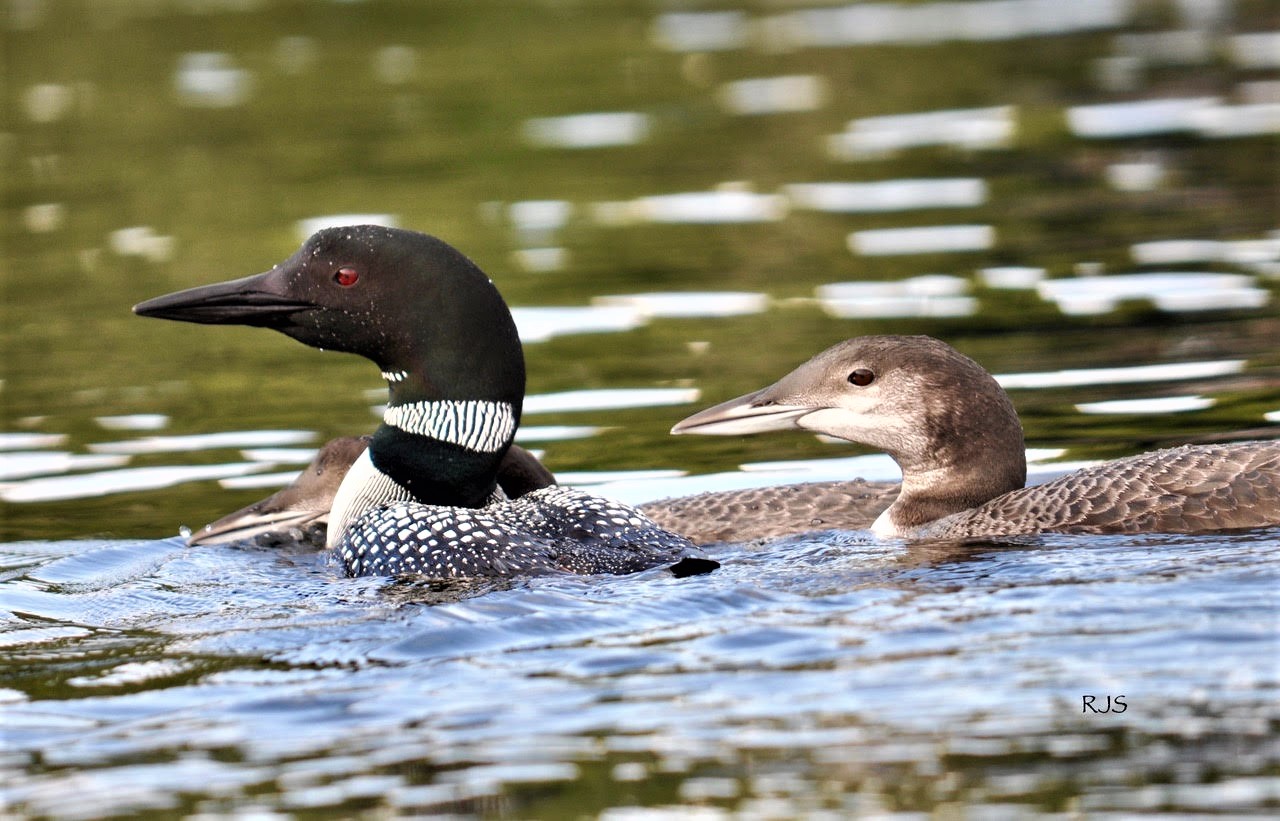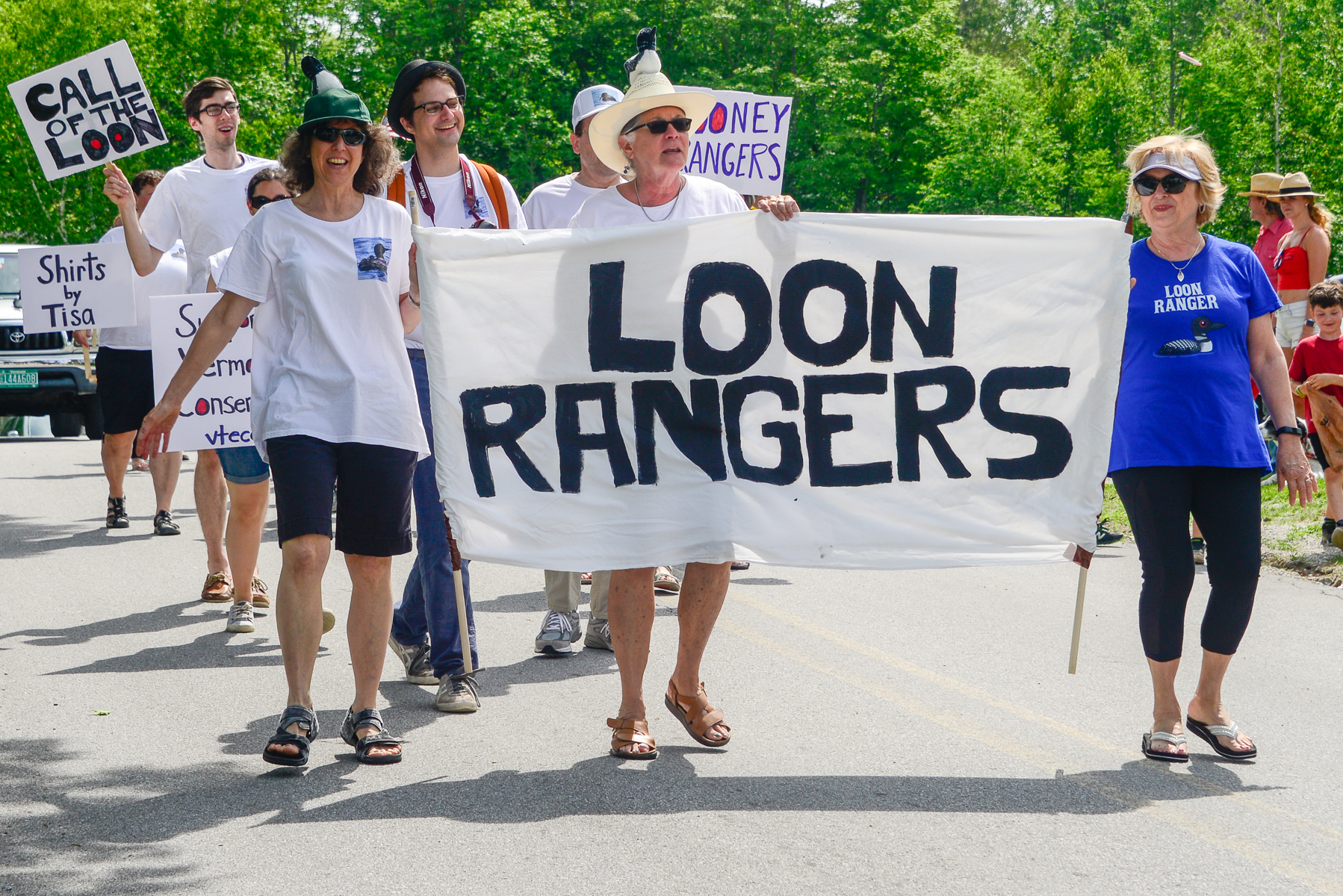
An adult loon and large chick cruise Maidstone Lake in Vermont’s Northeast Kingdom. / © Rebecca Scott
Late Loon Nests
This summer three loon pairs started nesting in early July, which is very late in the season for nest initiation. Two of these were re-nesting attempts in waterbodies of the Northeast Kingdom (Bald Hill Pond and Great Averill Lake). Loons will often “try again” if their first nest fails before mid-June. The Bald Hill Pond pair’s first nest flooded during the June 19 deluge, when two to five inches of rain fell statewide. Apparently undeterred, the pair was observed back on the original nest site on July 5th. Over on Great Averill Lake, participants at VCE’s Loon Lakes and Summer Songbirds retreat at Quimby Country Resort found a depredated nest on the lake’s wandering nest raft on June 27th. VCE summer intern Jake Campbell and I returned on August 1st to re-anchor the raft with new cement blocks and discovered a nice surprise—an incubating adult!
We found the third late-nesting pair on the southern end of the state at Somerset Reservoir. We had assumed all three resident pairs were either done nesting or not nesting in early July, but then on July 10th a Vermont Loon Conservation Project volunteer reported seeing a loon on a nest. Loon conservation on Somerset is tricky because it is also a hydropower facility. Great River Hydro is required by their license to hold water levels steady for loon nests during normal nesting season. However, they also have to maintain a minimum downstream flow, which was difficult to do during this particularly dry July. Thanks to the great staff at Great River Hydro it all worked out in the end, without a single stranded or flooded loon nest, and another successful nesting season on Somerset Reservoir.
All three late-nest sites were successful, evidenced by volunteers reporting one chick at each site in early August. These three chicks should be old enough to fly by the end of October, but we’ll do some extra surveys in mid- to late-November to be sure.
Game Wardens Rescue Loon from Fishing Line
The day before I left on a seven-day vacation in early August, a report came in about a loon wrapped up in fishing line on Lake Ninevah. The loons of Lake Ninevah are lucky to be stewarded by local residents who keep a vigilant eye on “their” loons. This picture from the Mount Holly July 4th Parade says it all:
Given my schedule, I wasn’t able to rush to this loon’s rescue, so I provided two Vermont Fish &Wildlife Department game wardens, Tim Carey and Kyle Isherwood, guidelines on how to conduct a night capture in case they were up for the challenge. Even though free-swimming loons in fishing line are not always catchable, it’s worth at least one early attempt in case we get lucky and can remove the line while the loon is still strong and healthy.
Tim and another warden gave it a go a few days later and successfully netted the loon. These two short videos document the captured loon’s release:
Fishing line was loosely wrapped around the loon’s head and had not caused tissue damage, nor was any apparently ingested. Luckily, this loon was relatively easy to capture. Last year on Lake Raponda there was a loon in a similar situation that became spooked and avoided capture on multiple attempts, ultimately migrating with the line still intact.
With loon nesting activity in the rear view mirror, the sun has not set on this management season. Even as I write this, I have just received two more reports, one about a loon in fishing line and another with a lure on the bill, both free-swimming. So much for writing final reports. Stay tuned for a wrap-up of the 2019 loon season in this fall’s Field Notes.


There were loons with fledged chicks spotted on Long Pond (Sheffield/Glover) about 2 weeks ago. Thank you for your instructional video about what to do/what group to contact if they’re caught in fishing line. As to the posting about leeches in that pond–do these affect the loons?
Appreciatively,
Thanks for the note about Long P. That is a first time nest. We’ve been sending a volunteer up there for a decade now and noted two adult loons occasionally, putting the pond on the “watch list” for breeding pairs. Now confirmed. Eric Hanson
Thank you, Eric, and everyone who helps you, for your efforts on behalf of our loon population. We are fortunate to have you here in Vermont.
Thanks for the shout-out Eric re: Great River Hydro efforts manage storage reservoir water resources at Somerset for both loon nesting success above the dam and riverine fishery resources downstream of the the dam. In cases like these, hydroelectric generation is our last consideration. Multiple resource protections are required in our operating licenses, but cannot also conflict with each other. Its also important to understand that neither of these protections would have been possible without the ability to actively manage the water storage and water releases; in contrast to a natural water system that would fluctuate due to precipitation and hot dry seasonal conditions; potentially causing elevation related impacts and extreme low water and high temperature conditions in the river below. Again thanks for the acknowledgement.
Hi
I’m very sorry that the hot temperatures kept me away for the July field work this year.
I plan to take part again when the 2020 loon project gets underway!
Becky